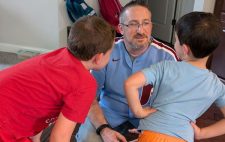As the school year begins, you can help your child prepare for a successful school year.
“I really try to reinforce to kids that these studying tips are habits – habits you’re going to need your whole life,” says Ashlynne Thompson, assistant director of college counseling at Moorestown Friends School. We talked to some teachers who offered these six tips for helping your kids study this year:
1. Go shopping!
Even if the kids were at camp, playing sports or worked a summer job over the last few months, getting back into the swing of things at school can take some adjusting. Start dialing back bedtimes for younger children in the weeks before school starts – not just the night before, says Thompson, who also teaches a study skills class at MFS. Physical reminders, like going shopping for school supplies, can also be helpful in getting kids in the right mindset.
This might sound funny, but when you shop for school supplies, take your child with you.
“Don’t just do the shopping for them,” Thompson says. “They need to take responsibility.” Let your kids pick out their own planners and supplies – if they pick it out, they’ll know what they want to use it for.
2. Get organized and make a plan
Make sure your student has supplies that will keep them super organized and even make life a little less stressful.
“I’m a big fan of the one binder system,” says Thompson. ““One binder helps a kid at the end of the day – when there are extracurricular activities to hurry to – know everything’s inside.”
If a teacher insists on a separate folder or notebook for a one class, try color coding. “Put colored labels on the spine of your books, then pick matching colored folders,” suggests Thompson. And make sure everything is packed at night for the next day – it saves a whole lot of trouble in the morning.
When it comes time to study, Thompson recommends parents help kids make a study plan. “Use a planner, write it down,” she says. Make a schedule with your child: for example, study math from 4 to 4:30 pm and science from 4:30 to 5 pm. Then be sure your child sticks to the plan.
3. Set the scene
Thompson says one of the biggest problems for students trying to study at home are all the distractions – specifically the electronic kind. Designate a particular place as a study area, she says, “A place where there are no screens on.” Make sure it’s a quiet room where you know distractions will be minimal.
4. Give them time
As kids get older and begin studying advanced material, they’ll require more time for homework. When they hit a wall, don’t rush them.
“My advice is to give that math problem a good ten minutes,” Thompson says. “If you’re still stuck, write down what you know and where you’re stuck.” Share this information with the teacher – they want to know exactly where your child is running into trouble, so they can figure out the pattern and help them move around the issue. If it’s stress or overwork that is keeping your child from focusing, there’s a simple trick to helping them.
“I learned this years ago at a workshop,” Thompson continues. “When your child is completely overwhelmed and they’ve shut down, ask them this question: What is the one thing you could do right now that would make the biggest difference? It can be something as easy as going to pack your P.E. clothes for the next day. Doing this one thing releases the kid from the desk for a moment, and then they can come back and buckle down and focus.”
 5. Studying is not a one-person job
5. Studying is not a one-person job
Parents should be involved in helping their children study, says Melissa Deppe, a third grade teacher at McGowan Elementary School in Edgewater Park.
“I say this at Back-to-School Night every year,” she says. “I tell parents, ‘I need your help as well.’ I can tell students in class how to study, but parents have to show them at home.” She recommends parents use Back-To-School Night as an opportunity to talk to teachers about implementing organization, time management and study habits.
But remember that every child learns differently, says Thompson, and the strategies that worked for you might not work for your children.
“It’s hard to sit on your hands and let them flail while they find out what works for them,” Thompson adds, but it’s something that must be done. Younger students may need a lot of help, but when students start fifth or sixth grade, parents should remain involved while still taking a step back.
You don’t have to answer every question, Thompson says. “Try to rephrase the question, so they think about it in a different way.”
6. Remember to keep it balanced
“I do think there’s such a thing as too much studying, just like there’s such a thing as too much homework,” Deppe says. “Kids aren’t just students. They play sports and take ballet and art class, and do other activities. There has to be balance.” Deppe suggests teaching your child how to avoid cramming, and instead studying a little bit each night. Teaching good time management will help them enjoy their activities while staying current with their studies.
But remember, Thompson adds, even students with the best study habits won’t necessarily be at the top of the class.
“No one wants to hear this, but not every child is an A-student,” Thompson says. “Studying more will not always help your child.” Instead, help them develop efficient study habits, so they get the most from their effort. Most of all, make your number-one goal keeping your student well-rounded and happy.



 5. Studying is not a one-person job
5. Studying is not a one-person job









